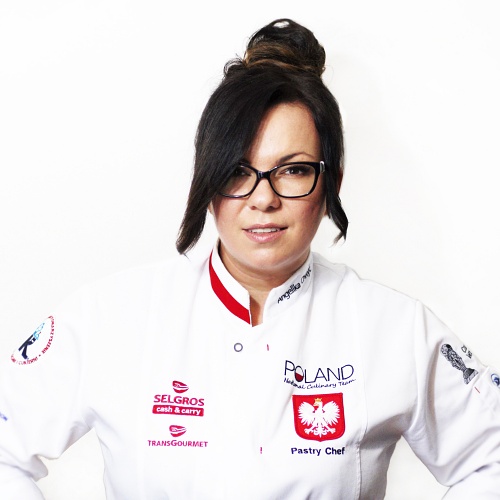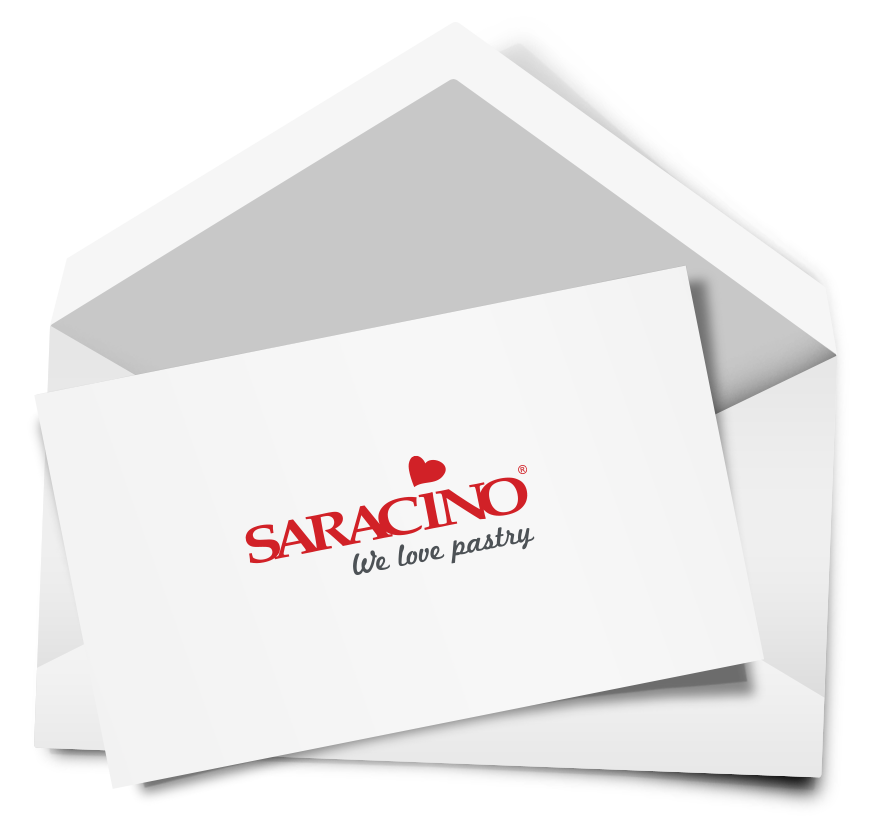
Author: Angelika Chwyc
Skill level: INTERMEDIATE
TIP:
Remember!
- When we mix colours they become a shade darker after some time / during work and drying. Take this into account especially when blending your skin tone
- To protect the paste from drying out, pack it into a bag and take out only as much as you need each time
- Before using the paste always knead well to make more workable and smoother to use
You will need:
-
Nude – a combination of Saracino Pasta Model and Saracino modelling white chocolate in a 1:1 ratio.
-
For colouring I used a copper Saracino powder for my chosen skin tone. You can use any colour you wish.
-
Head 20g
-
One leg 8g
-
Torso 15g
-
One hand 3g
-
Red Pasta Model approx 5g
-
Brown Pasta Model approx 30g
-
Green and black Pasta Model – a small amount for the eyes and their finish
-
Powder colours – black or brown and pink or red
-
Gold powder colour
-
Green powder colour for the eyes
-
Kitchen scale
-
Non-stick silicone mat
-
Non-stick silicone roller
-
Scalpel
-
Knife
-
Ball tool with a diameter of 10mm and 1mm
-
Brush (soft for shading) 6mm or similar
-
Contour brush
-
Toothpicks
-
Wooden skewer
-
Water
-
Corn flour
-
Latex / nitrile gloves
-
Wet wipes
-
Dry wipes

Step 1
For the head roll an oval shape.

Step 2
Then place your thumb on the underside at a slight angle. Use your index finger to bend and flatten / shape the top a little.

Step 3
Approxiamtely 1/3 from the top, press a wide indentation with your finger for the eye area.

Step 4
Shape so the groove slightly extends over each side.

Step 5
Use your fingers to shape the chin area.

Step 6
The head of the figurine should have a slightly triangular shape to the chin area.

Step 7
Use a ball tool to form eye sockets.

Step 8
For the nose place a small ball below the eye area.

Step 9
Using a cocktail stick blend a little paste upwards. You can also use a modelling tool if you prefer.

Step 10
Repeat to the sides of the nose.

Step 11
Using a modelling tool or cocktail stick form two nostils.

Step 12
For the mouth area mark the dimples shown in the photo. Ideally these should be halfway between the nose and the base of the chin.

Step 13
Use the side of a modelling tool to add more shape to the chin below the dimples.

Step 14
Doing this will push paste upwards to add to the mouth area.

Step 15
Roll a little red Pasta Top to the shape shown and add to the mouth. Be careful not to add too much paste or the lips will be too big.

Step 16
Use a cocktail stick to spread the paste to the corners of the mouth.

Step 17
Roll two small balls of Pasta Model. Add them to the eye sockets as shown using a little glue if required. In order for the face to look attractive it is good practice to have the gap between each eye the same width as one eye. This way proportions are well balanced. Now add two dimples to the cheeks.

Step 18
Using the coloured Pasta Model fix the small upper eyelids

Step 19
Roll two balls for the eye colouring. Fix using a little glue and paint around the edge using a fine paintbrush.

Step 20
Roll two smaller balls of black paste and fix for the pupils. Roll a thin line of black Pasta Model and fix above each eye for the eyelashes.

Step 21
Repeat a similar procedure for the eyebrows.

Step 22
Use red or pink powder colour and a soft brush to add blush to the cheeks. Be careful not to add too much. It is easier to add more if needed than remove too much!

Step 23
For legs roll two sausage shapes slightly wider on one end.

Step 24
Halfway up each leg roll with your finger to form the knee area. Repeat 1/3 from the bottom for the ankle and to form the foot.

Step 25
Gently bend to form the foot.

Step 26
Using your thumb and forefinger model the heels.

Step 27
As our character is sitting with crossed legs bend the legs at the knees and place them on the board crossed as shown.

Step 28
For the torso begin with this shape.

Step 29
Roll the paste in your fingers to form the neck shape to the proportions shown. Bend it forward slightly.

Step 30
Insert the wooden skewer through the torso. When inserting gently twist the skewer and keep the shape of the torso.

Step 31
Place the torso over the top of the legs inserting the skewer into the base below. You do not need to blend the torso and legs together as the area will be covered with the skirt.

Step 32
Roll out red Pasta Model thinly and cut a rectangle of 2 x 20cm. Then fold pleats to create a frill.

Step 33
Using the same paste cut a thin strip for the waist of the skirt.

Step 34
Using the same paste cut a rectangle shape for the top. Fix around the chest area.

Step 35
We form the arms and hands similar to the legs. Use your finger to roll the elbow and wrist area leaving paste for the hand.

Step 36
For the thumb use a scalpel or sharp knife to remove a triangle of paste from the hand. Remember to leave sufficient paste for four fingers.

Step 37
Use the back of a cocktail stick to form three grooves for the fingers. Do not cut through all the way.

Step 38
When you do this the palm will spread. Use your fingers to lengthen and thin the fingers.

Step 39
Bend the left arm at the wrist.

Step 40
Bend the right arm at the elbow. Fix both arms to the shoulders. The right arm can be temporarily supported using a cocktail stick until dry.

Step 41
Blend each arm into the shoulders. As we have used Modelling Chocolate in our mix this will assist with flawless blending.

Step 42
Trim the timber skewer in the torso to a shorter length. Fix the head onto the neck at the required angle.

Step 43
Roll a piece of flat brown paste large enough to cover the back and top of the head.

Step 44
Fix to the head and add lines using a modelling tool, cocktail stick or knife.

Step 45
For the ponytail roll a longer piece of brown paste. Add lines.

Step 46
Shape the ponytail as you would like.

Step 47
Repeat this for the fringe and fix them to the head.

Step 48
Dust the hair using brown or black powder to give shade and definition. Do the same to the arms and legs using a shade darker than your chosen skin colour. You can add accessories to the figure such as a bow to the hair or flowers to the dress.





